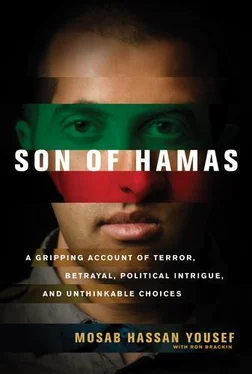A friend and I hid again another day, this time closer to the road. A settler car came, and when I stood up, I threw a stone as hard as I could. It hit the windshield, sounding like a bomb exploding. It didn’t break the glass, but I could see the driver’s face, and I knew he was terrified. He drove another forty yards or so, hit the brakes, and then threw his car into reverse.
I ran into the cemetery. He followed but stayed outside, steadying his M16 against the wall and scanning the graves for me. My friend had run off in the opposite direction, leaving me on my own against an angry, armed Israeli settler.
I lay quietly on the ground between the graves, knowing the driver was just waiting for me to lift my head over the low tombstone. Finally, the tension was too much; I couldn’t keep still any longer. I jumped up and ran as hard and fast as I could. Fortunately, it was getting dark, and he seemed afraid to enter the cemetery.
I hadn’t gone very far when I felt my feet fall out from underneath me. I found myself at the bottom of an open grave that had been prepared for the next person to die. Would that be me? I wondered. Above me, the Israeli sprayed the cemetery with bullets. Stone fragments rained into the grave.
I crouched there, unable to move. After about half an hour, I heard people talking, so I knew he had gone and it was safe to climb out.
A couple of days later, as I was walking along the road, the same car passed me. There were two guys in it this time, but the driver was the same. He recognized me and quickly jumped out of the car. I tried to run again, but this time I wasn’t so lucky. He caught me, slapped me hard across the face, and dragged me back to the car. No one said a word as we drove up to the settlement. Both of the men seemed nervous and gripped their guns, turning from time to time to look at me in the backseat. I wasn’t a terrorist; I was just a scared little kid. But they acted like big-game hunters who had bagged a trophy tiger.
At the gate, a soldier checked the driver’s ID and waved him through. Didn’t he wonder why these guys had a little Palestinian kid with them? I knew I should be scared—and I was—but I couldn’t help but stare at my surroundings. I had never been inside an Israeli settlement before. It was beautiful. Clean streets, swimming pools, a gorgeous view of the valley from the mountaintop.
The driver took me to the IDF base inside the settlement, where the soldiers took my shoes and made me sit on the ground. I thought they were going to shoot me and leave my body in a field somewhere. But when it started getting dark, they told me to go home.
“But I don’t know how to get home,” I protested.
“Start walking, or I will shoot you,” one of the men said.
“Could you please give me my shoes?”
“No. Just walk. And the next time you throw a stone, I will kill you.”
My house was more than a mile away. I walked all the way back in my socks, gritting my teeth as the rocks and gravel dug into the soles of my feet. When my mother saw me coming, she ran down the sidewalk and hugged me tight, nearly squeezing the breath right out of my lungs. She had been told that I was kidnapped by Israeli settlers, and she was afraid they would kill me. Over and over, she scolded me for being so foolish, all the while kissing my head and holding me tightly against her chest.
One might think I had learned my lesson, but I was a dumb little kid. I couldn’t wait to tell my cowardly friends about my heroic adventure. By 1989, it was a normal occurrence for Israeli soldiers to knock on our door and push their way into our home. They always seemed to be looking for somebody who had thrown stones and fled through our backyard. The soldiers were always heavily armed, and I couldn’t understand why they cared so much about a few rocks.
Because Israel controlled the borders, it was nearly impossible for Palestinians to get weapons in the First Intifada. I don’t ever remember seeing a Palestinian with a gun during this time—only stones and Molotov cocktails. Nevertheless, we had all heard the stories of the IDF firing into unarmed crowds and beating people with clubs. Some reports said that as many as thirty thousand Palestinian children were injured badly enough to require medical treatment. It just didn’t make sense to me.
One night, my father was especially late coming home. I sat by the window, watching for his little car to turn the corner, my stomach rumbling with hunger. Though my mother urged me to eat with the younger children, I refused, determined to wait for my dad. Finally, I heard the engine of his old car and shouted that Dad was home. My mother immediately started filling the table with steaming dishes and bowls.
“I am so sorry to be late,” he said. “I had to travel out of town to resolve a dispute between two families. Why didn’t you eat?”
He changed his clothes quickly, washed his hands, and came to the table.
“I’m starving,” he said with a smile. “I haven’t eaten a thing all day.” This was not unusual because he could never afford to eat out. The delicious aroma of my mother’s stuffed zucchini filled the house.
As we settled in and began to eat, I felt a rush of admiration for my father. I could see the exhaustion on his face, yet I knew how much he loved what he did. The grace he showed toward the people he served was matched only by his devotion to Allah. As I watched him talking with my mother and my brothers and sisters, I thought about how different he was from most Muslim men. He never thought twice about helping my mother around the house or taking care of us children. In fact, he scrubbed his own socks in the sink every night, just so my mother would not have to deal with them. This was unheard of in a culture where women considered it a privilege to scrub their husbands’ legs after a long day.
Now as we went around the table, each of us took turns telling our father all about what we were learning at school and what we had been doing with our time. Since I was the oldest, I let the little ones talk first. But just when it was my turn to speak, I was interrupted by a knock at the back door. Who could be visiting at this time? Maybe somebody had a big problem and had come to ask for help.
I ran to the door and opened the small window that served as a peephole. I did not recognize the man.
“Abuk mawjood?” he asked in fluent Arabic, meaning, “Is your father here?” He was dressed like an Arab, but something about him did not seem right.
“Yes, he is,” I said. “Let me call him.” I did not open the door.
My father had been standing behind me. He opened the door, and several Israeli soldiers came into our home. My mother quickly put a scarf on her head. Being uncovered in front of the family was okay, but never in front of others.
“Are you Sheikh Hassan?” asked the stranger.
“Yes,” my father said, “I am Sheikh Hassan.”
The man introduced himself as Captain Shai and shook my father’s hand.
“How are you?” the soldier asked politely. “How is everything? We are from the IDF, and we would like you to come with us for five minutes.”
What could they want with my father? I searched his face, trying to read his expression. He smiled kindly at the man, with no hint of suspicion or anger in his eyes.
“Okay, I can go with you,” he said, nodding at my mother as he walked toward the door.
“Wait here at home and your father will be back shortly,” the soldier said to me. I followed them outside, scanning the neighborhood for more soldiers. There were none. I sat down on the front steps to wait for my father to return. Ten minutes passed. An hour. Two hours. Still he did not come back.
We had never spent the night without our father before. Even though he was busy all the time, he was always home in the evening. He woke us for dawn prayer every morning, and he was the one who took us to school every day. What would we do if he didn’t come home tonight?
Читать дальше












